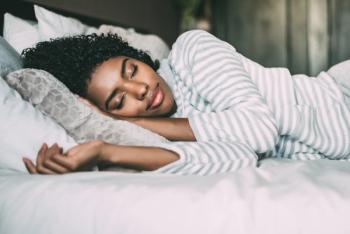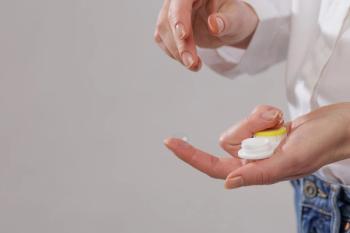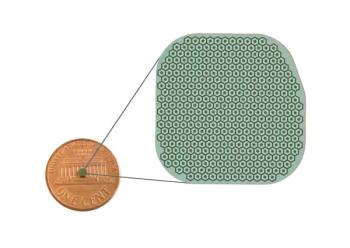
AAOpt 2022: CHAMP study shows positive top-line results for treating myopia
The CHAMP phase 3 study shows strong safety and efficacy of NVK002 for the treatment of myopia.
Houman Hemmati, MD, PhD, chief medical affairs officer at Vyluma, speaks with Optometry Times®' Kassi Jackson on the newly released CHAMP phase 3 study top-line results.
Editor's note: This transcript has been edited for clarity.
Jackson:
Hi everyone, I'm Kassi Jackson with Optometry Times and I'm joined today by Dr. Houman Hemmati, Chief Medical Affairs Officer at Vyluma. He's here to share top-line results from the company's phase 3 CHAMP study. Dr. Hemmati, thank you for joining us.
Hemmati:
Thank you for having me.
Jackson:
Will you please tell us about the study and share with us the top-line results?
Hemmati:
Absolutely. It's a pleasure to. We're very excited to announce our top line results for the CHAMP study of NVK002, which is the first 3-year, fully placebo controlled study of 2 doses of low dose atropine for the prevention of myopia treatment in children.
This was conducted across United States and several European countries of approximately 600 children. NVK002 is a proprietary investigational, low-dose, preservative-free atropine eyedrop that's administered nightly. And NVK002 leverages what we know already about a very well characterized therapeutic agent—namely atropine—in a new low-dose, preservative-free formulation to help address, really, the urgent need for pharmacologic myopia control.
The CHAMP study, which we're presenting the top-line for now is a 3-arm, randomized, double-masked, placebo-controlled phase 3 clinical trial. Like I said before, it's of approximately 600 children and adolescents—aged 3 to 17 years of age at the time of enrollment—and the study consists of 2 stages: A completed, 3-year treatment period to evaluate the safety and efficacy of NVK002, after which the enrolled patients were re-randomized for a masked, ongoing, 1-year treatment period to really characterize what happens after cessation of therapy, or re -randomization to one of the other treatment arms.
What we found in the top-line results are actually very exciting, and it's unprecedented for the history of ophthalmology. What we showed is that NVK002, at a dose of .01% atropine achieved statistically significant and clinically meaningful differences from placebo in every key outcome measures that we looked at for top-line. [This includes] a responder analysis, which is the proportion of subjects who progress less than -0.5 diopters of spherical equivalent refraction myopia mean change from baseline in their spherical equivalent refraction (SER), as well as the main change from baseline and axial length at month 36.
We also looked at a dose of 0.02%. And the point 0.02% demonstrated efficacy at several time points across multiple different endpoints that we've just mentioned, including a statistically significant change in axial length, compared to placebo at month 36. The responder analysis was not statistically significant month 36. And our safety data, we're actually quite excited, as well.
Both doses of NVK002 that we examined demonstrated very strong safety and tolerability, which were comparable to what we saw on the placebo, there were no ocular serious adverse events, and the incidences of non-ocular serious adverse events and discontinuations due to non-ocular serious adverse events were similar across the treatment groups. The most common ocular adverse events were hyperemia, photophobia, some allergic conjunctivitis, eye pruritus, eye irritation, and those were generally at very low levels.
Jackson:
Wonderful. So what do these results mean for patients, and also for clinicians?
Hemmati:
Well, this is an important question, right? We're developing this product really to serve an unmet need in the treatment of myopia progression and children.
As you know, there's been a lot of literature and widespread use of off-label, compounded, low-dose atropine globally—as well as particularly in the United States recently. And our intent is to create a commercial stable, preservative-free, well-characterized formulation that would really serve a major unmet need.
At this point, there are other treatment options available, but in terms of pharmacologic-approved treatment options—especially preservative-free treatment options—there has been nothing.
Our intent is to give one major treatment option to parents and to their children who are at risk for myopia progression, or who are already progressing in myopia, and allow them to have another treatment available in the armamentarium to treat what is now becoming a major global epidemic.
Jackson:
What is the take home message from these results that you want to be sure our audience knows?
Hemmati:
The take home message is that for the first time, Vyluma has established the safety and efficacy across a 3-year, fully placebo-controlled trial of children across a wide range of ages, as well as ethnic and racial backgrounds, as well as degrees of baseline myopia, to show that we have a safe, tolerable, and effective dose of a low dose atropine in a preservative-free formulation that now has demonstrated the potential to slow myopia progression in children.
So we're excited about the possibility of approval and availability of this product, hopefully in the future to patients, to parents, to optometrist, and to other eye care professionals who wish to prescribe it.
Jackson:
Great. Well, Dr. Hemmati, thank you so much for your time today.
Hemmati:
I appreciate it. Thank you.
Newsletter
Want more insights like this? Subscribe to Optometry Times and get clinical pearls and practice tips delivered straight to your inbox.





























